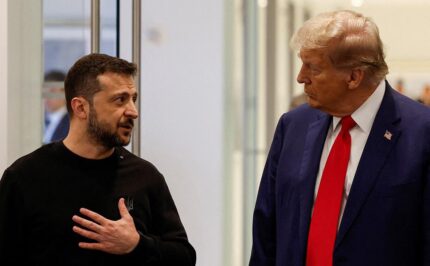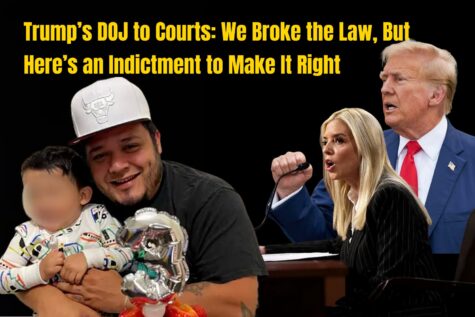In a striking and controversial statement, U.S. President Donald Trump has blamed Ukrainian President Volodymyr Zelensky for starting the war with Russia, just a day after a massive Russian missile attack on the Ukrainian city of Sumy killed at least 35 civilians and injured 117 others. Donald Trump, speaking at a White House press briefing on Monday, also accused Russian President Vladimir Putin and former U.S. President Joe Biden of sharing responsibility for the devastating conflict.
“You don’t start a war against someone 20 times your size and then hope that people give you some missiles,” Trump said, in remarks that stunned both political allies and critics alike. He continued, “Millions of people dead because of three people — let’s say Putin number one, let’s say Biden who had no idea what the hell he was doing, number two, and Zelensky.”
Although international casualty estimates place the death toll in the hundreds of thousands rather than millions, Trump’s comments have drawn widespread backlash from pro-Ukraine advocates and global leaders who view Russia as the clear aggressor in the two-year-old conflict.
Aftermath of Deadly Sumy Strike Draws Global Outcry
Donald Trump’s remarks come in the wake of Russia’s deadliest strike on civilians this year. On Sunday, two Iskander missiles reportedly hit central Sumy on Palm Sunday, causing chaos and destruction in residential neighborhoods. Ukrainian officials said the missiles struck “right in the heart of the city,” killing 35 people, injuring 117, and damaging churches, hospitals, and civilian infrastructure.
President Zelensky described the attack as a war crime, stating that it deliberately targeted civilians. “This was not a military operation, it was terrorism,” he said in a televised address. Despite Moscow’s claim that it targeted a gathering of Ukrainian soldiers and killed 60, it failed to present any evidence.
The attack has intensified calls for increased Western support for Ukraine. However, Trump appeared more interested in assigning blame, telling reporters that he had been told Russia made “a mistake” in Sumy but did not elaborate further.
Clashes Between Donald Trump and Zelensky Intensify
The relationship between Trump and Zelensky has remained fraught since Trump returned to the White House earlier this year. Their tensions reached a boiling point during a February meeting at the White House, where Trump accused the Ukrainian leader of “gambling with World War Three” and chastised him for not initiating peace talks with Russia sooner.
Donald Trump, who has long promoted a policy of engagement with Moscow, has previously signaled skepticism about U.S. military aid to Ukraine and has publicly questioned the competence of Zelensky. “When you start a war, you got to know you can win,” Trump said Monday. “He’s always looking to purchase missiles — that’s not leadership, that’s desperation.”
These repeated criticisms have cast a shadow over U.S.-Ukraine relations at a time when Ukrainian forces face mounting pressure from renewed Russian offensives across the front line.
Zelensky Urges Donald Trump to Witness Ukraine’s Suffering Firsthand
Prior to the Russian strike on Sumy, Zelensky had issued a public invitation to President Trump, urging him to visit Ukraine before making any deals with Putin. In a CBS 60 Minutes interview, Zelensky implored, “Please, before any kind of decisions, any kind of forms of negotiations, come to see people, civilians, warriors, hospitals, churches, children destroyed or dead.”
Zelensky’s appeal highlights the increasing sense of isolation Ukraine feels as international attention on the war shifts. Ukrainian officials continue to lobby for more advanced weaponry and tighter sanctions on Russia, but Trump’s recent remarks have sparked fears that U.S. support could wane.
Despite this, Trump insisted Monday that he wants to “stop the killing” and promised forthcoming proposals to end the war, though he offered no specifics.
Moscow Talks and Trump’s Russian Engagement Strategy
While condemning Zelensky, Trump’s administration has quietly ramped up diplomatic outreach to Moscow. Last week, U.S. special envoy Steve Witkoff met with Russian President Vladimir Putin in St. Petersburg for over four hours. According to the Kremlin, the discussions revolved around “aspects of a Ukrainian settlement,” but no details were disclosed.
The Biden administration, as well as key NATO allies, have warned against any unilateral peace deal with Russia that does not include Ukraine’s full consent. Critics fear Trump’s approach could legitimize Russian territorial gains and undermine Ukraine’s sovereignty.
The roots of the war trace back to 2014, when Russia annexed Crimea following the ouster of Ukraine’s pro-Russian president. Since then, the conflict has evolved into Europe’s most devastating war in generations — one which now appears more complex and politically divisive than ever under the shadow of Trump’s remarks.














